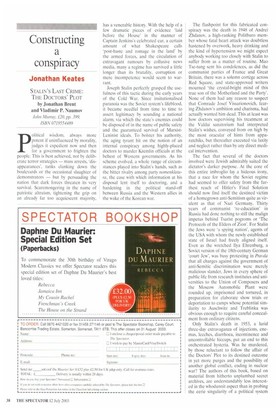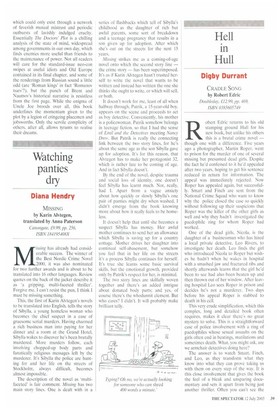Constructing a conspiracy
Jonathan Keates
STALIN'S LAST CRIME: THE DOCTORS' PLOT by Jonathan Brent and Vladimir P. Naumov John Murray, £20, pp. 399, ISBN 0719554489 political wisdom, always more potent if uninfluenced by morality, judges it expedient now and then for a government to frighten the people. This is best achieved, not by deliberate terror strategies — mass arrests, 'disappearances', tanks clanking down the boulevards or the occasional slaughter of demonstrators — but by persuading the nation that dark forces threaten its very survival. Scaremongering in the name of patriotic altruism, tightening the grip on an already far too acquiescent majority,
has a venerable history. With the help of a few dramatic pieces of evidence 'laid before the House' in the manner of Captain Jenkins's celebrated ear, a certain amount of what Shakespeare calls 'post-haste and romage in the land' by the armed forces, and the circulation of extravagant rumours by collusive news media, many a regime has survived a little longer than its brutality, corruption or mere incompetence would seem to warrant.
Joseph Stalin perfectly grasped the usefulness of this tactic during the early years of the Cold War. Since insitutionalised paranoia was the Soviet system's lifeblood, it became needful from time to time to assert legitimacy by sounding a national alarm, via which the state's enemies could be disposed of in the name of public safety and the guaranteed survival of MarxistLeninist ideals. To bolster his authority, the aging tyrant hit on the notion of an internal conspiracy among highly-placed doctors to murder Kremlin officials at the behest of Western governments. As his scheme evolved, a whole range of circumstances played into Stalin's hands, such as the bitter rivalry among party nomenklatura, the ease with which information at his disposal lent itself to doctoring, and a hardening in the political stand-off between Russia and the Western allies in the wake of the Korean war. The flashpoint for this fabricated conspiracy was the death in 1948 of Andrei Zhdanov, a high-ranking Politburo member whose fatal heart attack was doubtless hastened by overwork, heavy drinking and the kind of hypertension we might expect anybody working too closely with Stalin to suffer from as a matter of routine. Mao Tse-tung sent his condolences, as did the communist parties of France and Great Britain, there was a solemn cortege across Red Square, and state-approved writers mourned 'the crystal-bright mind of this true son of the Motherland and the Party'. None of them had any reason to suspect that Comrade Josef Vissarionovich, fearing Zhdanov's ambition and charisma, had actually wanted him dead. This at least was how doctors supervising his treatment at the Valdai sanatorium had interpreted Stalin's wishes, conveyed from on high by the most oracular of hints from apparatchiks, but thereafter executed via laxity and neglect rather than by any direct medical intervention.
The fact that several of the doctors involved were Jewish admirably suited the dictator's darker purpose. At the core of this entire imbroglio lay a hideous irony, that a race for whom the Soviet regime had seemed to offer safety from the furthest reach of Hitler's Final Solution should now find itself the destined victim of a homegrown anti-Semitism quite as virulent as that of Nazi Germany. Thirty years of communist 're-education' in Russia had done nothing to still the malign impetus behind Tsarist pogroms or 'The Protocols of the Elders of Zion'. For Stalin the Jews were 'a spying nation', agents of the USA with whom the newly established state of Israel had freely aligned itself, Even as the wretched Ilya Ehrenburg, a Soviet version of the 18th-century German 'court Jew', was busy protesting in Pravda that all charges against the government of anti-Semitic discrimination were merely malicious slander, Jews in every sphere of public life from research institutes and universities to the Union of Composers and the Moscow Automobile Plant were rounded up, imprisoned and tortured, in preparation for elaborate show trials or deportation to camps whose potential similarity to Auschwitz and Treblinka was obvious enough to require careful concealment from ordinary citizens,
Only Stalin's death in 1953, a lurid three-day extravaganza of injections, enemas, leeches, diarrhoea, incontinence and uncontrollable hiccups, put an end to this orchestrated hysteria. Was he murdered, by those reluctant to follow the affair of the Doctors' Plot to its destined outcome in yet more purges and the possibility of another global conflict, ending in nuclear war? The authors of this book, based on material from hitherto unplumbed secret archives, are understandably less interested in the whodunnit aspect than in probing the eerie singularity of a political system which could only exist through a network of feverish mutual mistrust and periodic outbursts of lavishly indulged cruelty. Essentially The Doctors' Plot is a chilling analysis of the state of mind, widespread among governments in our own day, which finds enemies more useful than friends to the maintenance of power. Not all readers will care for the standard-issue neo-con swipes at useful idiots and Old Europe contained in its final chapter, and some of the renderings from Russian sound a little odd (are 'Roman kings' in fact `Romanov tsars'?), but the punch of Brent and Naumov's historical narrative is resistless from the first page. While the enigma of Uncle Joe broods over all, this book underlines the momentum given to the plot by a legion of cringe ing placemen and jobsworths. Only the servile complicity of others, after all, allows tyrants to realise their dreams.



































































 Previous page
Previous page